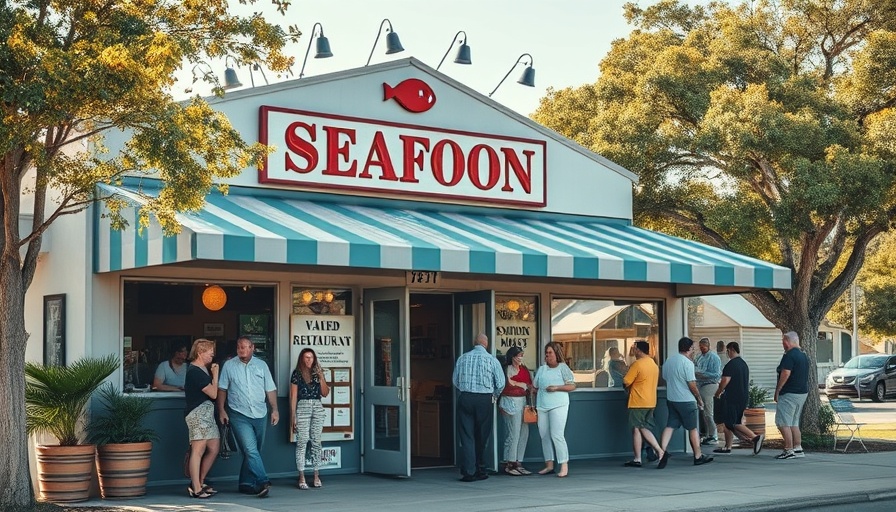
From Farm to Fork: Embracing Local Produce for a Sustainable Future
The charm of a local farmers' market isn’t just about colorful produce and friendly faces; it's about understanding the journey of our food from pasture to plate. Meet Doe Gregoire, a pioneer in organic farming at Four Winds Farm in Cawston, BC, as she enthusiastically shares her applied knowledge about apples. With her hands in the soil, monitoring her McIntosh and Spartan trees, Doe embodies the hands-on approach that is increasingly scarce today. By actively participating in the growth of her food, she represents a movement toward choosing local and organic, creating a bond that mirrors a healthier lifestyle.
The Environmental Impact of Food Choices
In an age where groceries are often imported from thousands of miles away, reconsidering our food choices can have a profound environmental impact. Did you know that imported garlic traveled an average of 12,392 kilometers to reach your kitchen? This extensive journey results in significant greenhouse gas emissions, much of which can be avoided by opting for local alternatives. According to the David Suzuki Foundation, every kilogram of local garlic purchased saves over 1,700 grams of CO2 emissions, showcasing the direct influence of consumer choices on our planet’s health.
Health Benefits of Buying Locally
Beyond reducing environmental burdens, purchasing local produce often leads to healthier meals. Foods transported internationally are frequently treated with waxes, gases, and fungicides to increase shelf life. However, fresh, local produce is less likely to require such treatments, making it a safer option for consumers. Plus, local fruits and vegetables tend to be picked at their peak ripeness, ensuring higher nutritional values when they reach our tables. Gregory emphasizes this when she mentions the convenience of asking questions directly to producers at the market, ensuring you know what you are consuming.
Building Community and Economic Support
Supporting local farmers not only benefits our own health, but it also strengthens community ties and stimulates local economies. Family farms are becoming rare as larger agricultural businesses dominate. By buying locally, you contribute to the sustainability of small farms and the traditions surrounding them. This intimate connection cultivates relationships between consumers and producers, allowing for questions and discussions about food sources and farming practices. When you buy local, you support local families and preserve the cultural heritage of food in your community.
Actions You Can Take: Encouraging Change on Your Plate
So how can you participate in this important shift? Start by exploring your local farmers' markets. Engage with vendors, ask about their farming processes, and most importantly, speak up! Encourage your local grocery stores to feature more locally sourced produce. A great initiative might include hosting a dine-locally dinner theme with friends to explore regional dishes. Additionally, joining organizations like Slow Food, committed to promoting local food traditions, can help turn the tide towards mindful eating.
Future Predictions: The Impact of Conscious Consumerism
As we move into a future increasingly focused on sustainability, the importance of conscious consumerism becomes paramount. Trends indicate that more consumers will prioritize ethical sourcing, organic farming, and eco-friendly practices. The rise of community-supported agriculture (CSA) models demonstrates a growing appreciation for local food systems. By aligning your eating habits with these values, you not only support your health but the health of our planet, fostering a culture that respects both nature and community.
Common Misconceptions about Local Foods
While many people might believe that local foods are significantly more expensive, the truth is that purchasing in-season produce can often be more affordable than imported goods, especially when factoring in the cost to the environment. Moreover, the belief that farmers' markets only offer fruits and vegetables is a myth; many provide dairy, meats, and baked goods, offering a comprehensive selection for any meal plan.
Embracing local foods isn't just a personal choice; it's a commitment to improving community resilience, environmental integrity, and personal health. By making conscientious decisions about what we consume, we can all become part of a burgeoning movement that brings us closer to the farmers and ecosystems we rely on. Let's act together—visit your local market, support your community, and make educated choices that impact not just your plate, but the world around you.
 Add Row
Add Row  Add
Add 



Write A Comment